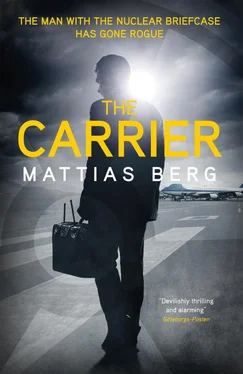Mattias Berg - The Carrier
Здесь есть возможность читать онлайн «Mattias Berg - The Carrier» весь текст электронной книги совершенно бесплатно (целиком полную версию без сокращений). В некоторых случаях можно слушать аудио, скачать через торрент в формате fb2 и присутствует краткое содержание. Город: London, Год выпуска: 2019, ISBN: 2019, Издательство: MacLehose Press, Жанр: Триллер, на английском языке. Описание произведения, (предисловие) а так же отзывы посетителей доступны на портале библиотеки ЛибКат.
- Название:The Carrier
- Автор:
- Издательство:MacLehose Press
- Жанр:
- Год:2019
- Город:London
- ISBN:978-0-85705-788-4
- Рейтинг книги:4 / 5. Голосов: 1
-
Избранное:Добавить в избранное
- Отзывы:
-
Ваша оценка:
- 80
- 1
- 2
- 3
- 4
- 5
The Carrier: краткое содержание, описание и аннотация
Предлагаем к чтению аннотацию, описание, краткое содержание или предисловие (зависит от того, что написал сам автор книги «The Carrier»). Если вы не нашли необходимую информацию о книге — напишите в комментариях, мы постараемся отыскать её.
The Carrier — читать онлайн бесплатно полную книгу (весь текст) целиком
Ниже представлен текст книги, разбитый по страницам. Система сохранения места последней прочитанной страницы, позволяет с удобством читать онлайн бесплатно книгу «The Carrier», без необходимости каждый раз заново искать на чём Вы остановились. Поставьте закладку, и сможете в любой момент перейти на страницу, на которой закончили чтение.
Интервал:
Закладка:
I met an older woman, ancient, who was crying in the same way as the girl I had seen: also calling out for her mother—though she must have been dead for many years. It was so strange, I told the conference. But the only answer she got was: “Everybody else is in just as much pain as you. Try to put up with it.”
In the end I found my own mother, but hardly recognized her swollen face and her closed eyes. The skin on both her hands was hanging loose, like rubber gloves. She died before the end of the war, I said in my account, and I never saw my father again.
After I had finished—“My thanks to you, I’m called Yukiko and I’m seven years old!”—everybody broke into long applause and then it was time for lunch. Reconvening at 13.15, the conference chairman, the American, said.
On the way out, just as the American had moved to try to hug me, I pulled him down and thumped his head hard into the floor.
Then I ripped out his tear-filled eyes: first one, then the other. Because in any event he could never see what I had seen.
3.04
I worked on it all, on the situation I found myself in, in the only way I knew. The first mornings, short intervals: five reps of 10 × 150 yard sprints just behind the hotel, on the small path where the snow had been cleared to make way for the garbage truck. A resting walk back between sprints and a minute’s recovery between reps. The extreme cold crackled in my nose as I breathed in. Negative twenty-two before the sun rose. Then mid-intensity strength training in my room and an ice-cold shower.
Slowly but surely I also dared to venture further afield, so early that few others had reason to be about. The third morning my wrist-watch showed 04.45 as I unlocked the front door. Warmed up with a few relaxed strides: 5 × 85 yards in the tracks left by the garbage truck. Then I followed the unlit ski track straight in-between the gnarled dwarf birches, silvery with frost, small shining ghostly figures twisted in pain and dread. The snow made my headlamp superfluous. After a few hundred yards my eyes had adjusted. My spikes also held perfectly on the icy surface, my steps unexpectedly light. Despite the cold I was able to maintain 6.9 minutes per mile without too much effort.
The track followed the edge of town, even further down into the sink-hole, in the direction of the mine. Yet I resisted the temptation to try to penetrate further into the area. Didn’t dare to allow myself to be sucked in, dragged down. After three laps—my watch showed just over seven and a half miles—I adjusted the straps on the hybrid and increased my speed to six and a half minutes per mile. It was my benchmark. The indicator that I was at last back in fighting shape after the surgery in Ursvik.
I took the hotel stairs to the conference level in four big steps. The meeting room had been built as a kitschy Lapp hut with low lighting, and it backed onto the sauna and a small gym which time had forgotten. I turned on the aged treadmill and ran another seven and a half miles, at fast distance pace, before I finished off with a hard set of strength intervals.
Only then did I start to approach that state of white exhaustion, dizziness, the absolute limit. The near-unconsciousness which had been my elixir of life for so long. Which had made me able to endure.
Because sooner or later we all become addicted to something in this world. Soldiers in wartime have always been stoned: on drugs, political rhetoric, religious fanaticism. But research showed that even in peacetime a quarter of all military personnel in the U.S. regularly took drugs, not just hash but also cocaine and L.S.D. On a number of occasions hundreds of people had even been arrested after crackdowns at our nuclear bases.
In the sauna I let the key lie in the palm of my hand, burning me. Wondered about showing it to Ingrid after all. Telling her that I was given it by Sixten: that the key to Meitner’s secret underground laboratory had not after all disappeared. And that he had given it to me—not to her.
But I did not, for that very reason. That it was me and not her he seemed to trust.
So the days went by in their curious way, even here. Between meals Ingrid mostly stayed in her room, barricaded behind her locked door. Claimed to need every waking hour—and that was a long time, she told us, most of the day—to complete the process. Connecting all our nuclear weapons around the world.
Jesús María I never even glimpsed. The first days after we came here, to this strange hotel with its meandering corridors and stairs which somehow never seemed to connect, I had on a few occasions tried to find her. Knocked on her door during both day-time and night to ask her how she could know my “Key Sentence”. The basis for my most secret book cipher, which I had shown only to my mother, there by the kitchen table as a prematurely adult thirteen-year-old.
But Jesús María was never in her room—and it took me more than a week to trace her. She had joined the so-called “Girls”, a number of young women without residence permits whom Bettan had taken pity on. One early morning, on my way from the sauna, I caught sight of one of them walking down the next staircase to prepare breakfast in the kitchen area. So I followed the trail to Jesús María, and found her in their midst, as busy as the rest.
That also helped me to solve the mystery of the food. How for breakfast alone they could serve cold poached salmon, reindeer sausage, potato salad with thick home-made mayonnaise, scrambled eggs, Kalix bleak roe and fresh-baked rusks with cloudberry jam. The lunches and dinners were even more lavish: as if they had been meant for many more than just Ingrid, Bettan and me. Which they obviously were.
And soon we found ourselves in November. The passing time was measured by the blasting: at 1.30 a.m. each night everything shook. I had to carry out my checks—even though the briefcase, according to our technicians, was constructed to withstand a direct hit. Take it out of the hybrid, open the lid, continue the ritual up to the point where the electronic eye, the iris recognition, appeared. Then I started closing the case again. Carried out all these complicated commands, pressed long three-letter sequences on the keyboard, in the exact opposite order.
That was my routine, identical in every way, by the light of a single candle which was meant to neutralize the bluish glow from the screen in case anything seeped out through the boards covering the window. In case somebody was keeping me under observation. I ran an eye over the apparatus, looked to see that everything seemed in order after the blasting, and in some way it looked back at me. Everything exactly the same way—until November 2, 2013.
Just before closing the case that night, noticing the timer showing 02.07, I saw a terrifying reflection in the screen. Despite the fact that I had as ever locked the door, with the set of keys still in place, wedged the chair under the door handle, someone had managed to steal up behind my back. Pin my arms and bend my head sharply backward.
Then I felt the warm little kiss on my throat.
“I obviously came in the nick of time, my treasure. On the way to taking matters into our own hands, were we? Completely lost patience?”
There was a smile on Ingrid’s grotesque skeletal face: a mixture of war-paint and Halloween makeup, as if she had been playing around in front of the mirror. But her voice sounded purposeful and crystal clear.
“It’s All Saint’s Day here in Sweden. Yours, Erasmus, and everybody else’s.”
She took out her costume make-up, and in the reflection on the screen I could see how my face was quickly being transformed into a devil’s mask. How her eyes pierced right into me as I slowly answered:
“Yes, Ingrid… I was starting to think there would never be any action up here.”
Читать дальшеИнтервал:
Закладка:
Похожие книги на «The Carrier»
Представляем Вашему вниманию похожие книги на «The Carrier» списком для выбора. Мы отобрали схожую по названию и смыслу литературу в надежде предоставить читателям больше вариантов отыскать новые, интересные, ещё непрочитанные произведения.
Обсуждение, отзывы о книге «The Carrier» и просто собственные мнения читателей. Оставьте ваши комментарии, напишите, что Вы думаете о произведении, его смысле или главных героях. Укажите что конкретно понравилось, а что нет, и почему Вы так считаете.












